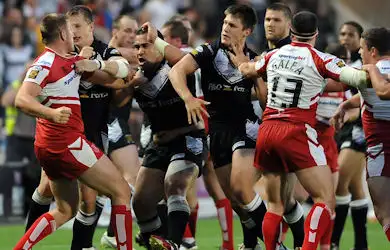When is a derby not a derby

The debate over which is the best derby is one that is often held among rugby league fans. For a few years the debate focused on the Lancashire derby of St Helens v. Wigan against the Yorkshire offering of Bradford v. Leeds. In more recent times the Hull derby has asserted itself as a credible competitor. There are other possibilities – Castleford v. Wakefield, Warrington v. Widnes, Halifax v. Huddersfield or Whitehaven v. Workington – but the debate tends to focus particularly on those three.
With the reinstitution of derby fixtures at the Magic Weekend these fixtures will be the very beginning of the season, and the debate takes on a contemporary significance.
However, I have to admit that I can’t seriously refer to a game between clubs from different towns or cities as a “derby” – only a game between clubs from the same town or city. This is going against the flow I realise – in sport people seem to be introducing wider and wider definitions of the word “derby”. The most egregious example of this was the original Magic Weekend. The initial marketing advertised that six derbies would be played – bad enough that this included Warrington v. Huddersfield, but it also included Harlequins v. Les Catalans. You can understand why these two would be paired together, but a derby? Really? They’re not even from the same country.
I can understand the problem with a more narrow definition: it leaves the only true derbies in professional rugby league as Hull v. Hull KR, Leeds v. Hunslet, and possibly Harlequins v. Skolars and Salford v. Swinton. I say possibly for the latter two because: firstly, London is so big and Twickenham so far from Tottenham that the Quins-Skolars fixture may not count; and secondly, I’m not sure whether Swinton is actually part of Salford or a totally separate town (answers on a postcard … or in the comments box).
On the face of it making a distinction between a derby and a local rivalry may seem petty, but the two imply different things. A local rivalry is two towns or two cities – two armed camps – going to war against each other. A derby is different. Battle lines aren’t drawn between two towns, but within a town: within schools and workplaces; within streets, households and families. While St Helens v. Wigan is a time when two superpowers war against each other, Hull v. Hull KR is civil war – a house divided against itself.
This is why you don’t get “derbies” in international sport. In international terms Australia v. New Zealand could be seen as a local rivalry, but certainly never a derby. However, if Australia ever did what we’ve often thought them capable of and fielded NSW and Queensland as two separate teams in an international tournament, when they met it could be seen as a derby because it would be the only fixture which pitted countrymen against countrymen – Australians against Australians.
Part of the reason for this point of view is that when I was growing up “the derby” was always Liverpool versus Everton. Even in my Widnes-supporting days the game against Warrington was an exciting rivalry for sure, but Liverpool versus Everton was always the derby. The fixture is just the kind of “civil war” I described above. While the Leeds-Bradford game pits Leodiensian against Bradfordian, the Liverpool derby pits Scouser against Scouser – and the Hull derby pits Hullensian against Hullensian.
Saints v. Wigan is an incredible rivalry – even more so given Wigan’s resurgence last season – while Bradford’s decline has lessened the status of their rivalry with Leeds. But the Hull derby is the best derby. It encapsulates what a derby should be about – rivalry within the boundaries of a city – while in the last few years also producing some truly excellent games that live up the game’s billing as a fierce and uncompromising derby match.
Keep Your Eye on Rugby League